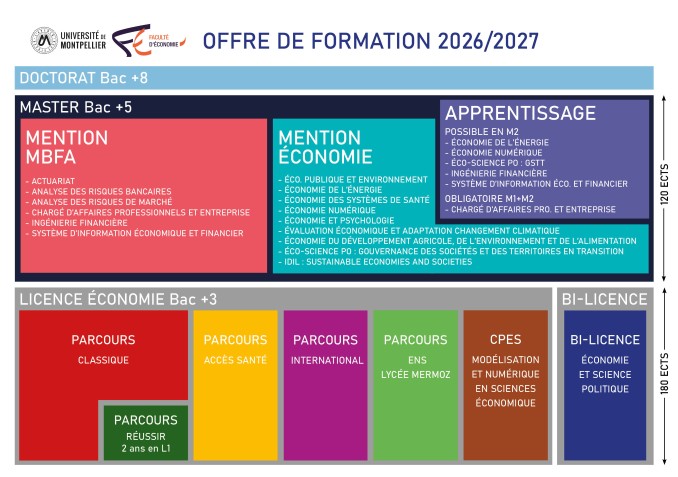Target level of study
Bachelor's degree
ECTS
180 credits
Duration
3 years
Training structure
Faculty of Economics
Language(s) of instruction
French
Presentation
The Bachelor's Degree in Economics is a general university program offering a curriculum structured around the major areas of economic analysis. It offers fundamental courses such as business economics, mathematics for economists, statistics, and economic history, as well as introductory courses in political science, law, and organizational management. This program aims to develop analytical skills, a solid economic culture, and a comprehensive understanding of how markets, organizations, and institutions work.
ISO 9001 certified, the Bachelor's degree offered by the Faculty of Economics at the University of Montpellier stands out for the quality and diversity of its programs.
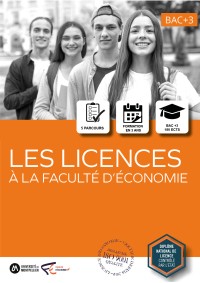
The advantages of the training program
- A DIVERSITY OF CAREERS
- SUPPORT FOR SUCCESS AND TUTORING
- A SOLID UNIVERSITY EDUCATION
Objectives
-
Provide fundamental knowledge of economics, particularly microeconomics, macroeconomics, and economic policy.
-
Provide training in analyzing the behavior and decisions of economic agents (households, businesses, governments) in their national and international environments.
-
Develop quantitative skills in mathematics, statistics, and data analysis tools applied to economics.
-
Acquire rigorous reasoning and analytical methods that enable the interpretation of complex economic phenomena.
-
Prepare students for further studies, particularly in master's programs in economics, management, finance, or related fields, as well as for gradual entry into the workforce.
Know-how and skills
Know-how
-
Analyze economic phenomena based on numerical data and economic indicators.
-
Use mathematical and statistical tools to model economic situations.
-
Interpret economic and social data using quantitative and qualitative methods.
-
Develop a well-reasoned economic argument, both in writing and orally.
-
Use computer and office tools for data processing and presentation.
Skills
-
Analytical and synthesis skills, to understand complex economic situations.
-
Methodological and scientific rigor, essential to the study of economic mechanisms.
-
Autonomy and organization of work, in a demanding academic environment.
-
Ability to work in a team and participate in group projects.
-
Ability to adapt, particularly in diverse economic and professional environments.
International dimension
Starting in their second year, students can spend a year (two semesters) at one of the 60 universities with which the Faculty of Economics has partnerships through the ERASMUS+ exchange programs, inter-university agreements, and CHARM-EU.
Organization
Knowledge assessment
The Bachelor's Degree in Economics, structured over three years and six semesters, is based on an assessment system designed to measure students' learning progressively and comprehensively. At the end of each semester, the skills, competencies, and knowledge acquired in each Teaching Unit (UE) are assessed in one of two ways: continuous assessment or a final exam.
Continuous assessment allows for regular monitoring of student progress through several forms of evaluation: supervised assignments, graded tutorials, presentations, projects, document analysis, and active participation in class. This method encourages attendance, regular work, and the gradual acquisition of skills.
The final exam consists of a written or oral test held at the end of the semester. It aims to assess the student's overall mastery of the concepts taught and their ability to apply their knowledge in a structured and in-depth manner.
Depending on the course units, teaching methods, or learning objectives, some units may combine both assessment methods. These methods ensure fair and diverse assessment that is tailored to the nature of the course, while allowing students to develop methodology, rigor, and autonomy throughout their academic career.
Special facilities
Students with disabilities, young entrepreneurs, and high-level athletes can benefit from personalized support.
This may take the form of study arrangements, educational adaptations, or specific rights, in order to enable them to best balance their personal or professional constraints with their university education. Depending on the situation, these measures may include an adapted schedule, adjusted assessment methods, attendance facilities, individualized monitoring, or dedicated support services.
Internships, supervised projects
Internship | Possible |
|---|---|
Duration of the internship | Maximum 924 hours, or 6 months |
Internship abroad | Possible |
A true immersion in the professional world, it allows students to apply the knowledge they have acquired in class, discover how organizations work, and compare theory with practice. To get the most out of it, serious preparation is essential: learning about the host organization, defining your objectives, mobilizing your skills, and preparing for professional demands.
During a bachelor's degree, internships are possible and optional. They must be related to the course of study.
The internship may begin at the end of the second semester exams or be completed during university vacation periods. In any case, it must end no later than August 31.
Program
Select a program
Bachelor's Degree in Economics, Classical Track
The Bachelor's Degree in Economics is a general university program offering a comprehensive curriculum structured around the major areas of economic analysis. It offersfundamental courses such as business economics, mathematics for economists, statistics, and economic history, as well as introductory courses in political science, law, and organizational management. This program aims to develop analytical skills, a solid understanding of economics, and a comprehensive understanding of how markets, organizations, and institutions function.
Throughout their studies, students can personalize their education with a wide range of options: business law, institutional economics, cost accounting, economic and social policy, international finance, environmental economics, allowing them to gradually specialize according to their academic or professional goals.
ISO 9001 certified, the Bachelor's degree offered by the Faculty of Economics at the University of Montpellier guarantees the quality of its teaching, the continuous improvement of its educational practices, and rigorous support for students throughout their university studies.
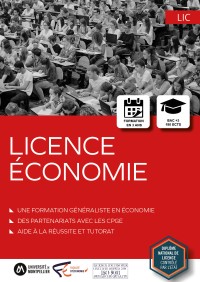
Business economics
5 creditsPrinciples of economics
5 creditsPolitical Science
4 creditsLaw
4 creditsHistory of economic events
5 creditsMathematics for Economists 1
5 creditsLANGUAGE SELECTION
2 creditsChoose one of two options:
English S1
2 creditsSpanish S1
2 credits
Optional
Mathematics and Statistics for Economists - 2 -
5 creditsGeneral accounting
Macroeconomics 1
5 creditsStatistics 1
5 creditsMicroeconomics 1
5 creditsChoose 1 out of 3
Contemporary economic issues
4 creditsLANGUAGE SELECTION
2 creditsChoose one of two options:
English S2
2 creditsSpanish S2
2 credits
Optional
Microeconomics 2
6 creditsMathematics for Economists 3
5 creditsMacroeconomics 2
6 creditsSociology
4 creditsStatistics 2
5 creditsComputer Science S3
2 creditsLANGUAGE SELECTION
2 creditsChoose one of two options:
English S3
2 creditsSpanish S3
2 credits
Optional
Computer Science S4
2 creditsMacroeconomics 3
6 creditsStatistics 3
5 creditsOrganizational management
5 creditsMicroeconomics 3
6 creditsLANGUAGE CHOICE English or Spanish
2 creditsOPTIONS
2 creditsChoose 1 out of 4
Business Rights
2 creditsGeographical economics
2 creditsEconomics of institutions
2 creditsEconomic demography
LANGUAGE SELECTION 2
2 creditsChoose one of two options:
Spanish Option
2 creditsEnglish Option
2 credits
Optional
History of economic thought
4 creditsGame theory
4 creditsIntroduction to Econometrics
4 creditsIndustrial organization
Growth economics
5 creditsLANGUAGE SELECTION
2 creditsChoose one of two options:
English S5
2 creditsSpanish S5
2 credits
List of options 1
3 creditsChoose 1 out of 4
Optimization
3 creditsPrivate economic calculation
3 creditsContemporary economic issues in depth
3 creditsCost accounting
3 credits
List of options 2
3 creditsChoose 1 out of 6
Labor economics
3 creditsUrban and spatial economics
3 creditsEnergy transition
3 creditsHealth economics
3 creditsDevelopment economics
3 creditsIntroduction to Environmental Economics
3 credits
Optional
Financial analysis
4 creditsData analysis
3 creditsInternational economics
4 creditsDatabase
4 creditsEconomic and social policy
5 creditsStudent Personal Project
2 creditsLANGUAGE SELECTION
2 creditsChoose one of two options:
English S6
2 creditsSpanish S6
2 credits
List of options 1
3 creditsChoose 1 out of 4
Applied Microeconomics
3 creditsSurvey theory
3 creditsEconomic analysis
3 creditsOperational research
3 credits
List of options 2
3 creditsChoose 1 out of 6
International finance
3 creditsIntroduction to Environmental Economics
3 creditsEconomics and psychology
3 creditsPolitical economy
3 creditsDigital economy
3 creditsHealth economics
3 credits
Optional
Optional
Bachelor's Degree in Economics, International Track
The Faculty of Economics at the University of Montpellier offers an international program taught in English.
This course can be chosen from the second semester of the first year of study.
It is based on the parallel study of ten fundamental courses taught in English, at a rate of two courses per semester (from semester 2 to semester 6), alongside the general bachelor's degree program. These courses replace the equivalent courses taught in French. Thus, each semester, students enrolled in the international track follow the standard bachelor's degree program, with two subjects replaced by their English-taught versions. All of these courses, tutorials, and exams are conducted in English.
This program allows students to strengthen their command of academic English and prepare for further studies or professional integration in an international context. It is particularly aimed at students who wish to work in multicultural environments or consider international mobility.
ISO 9001 certified, the Bachelor's degree offered by the Faculty of Economics at the University of Montpellier guarantees the quality of its teaching, the continuous improvement of its educational practices, and rigorous support for students throughout their university studies.
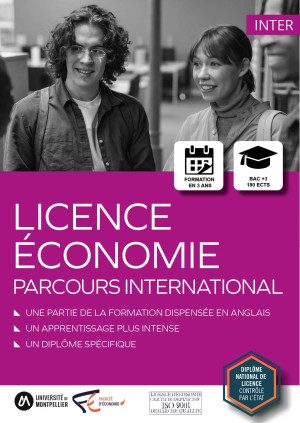
Business economics
5 creditsPrinciples of economics
5 creditsOptional Math Upgrade
Political Science
4 creditsLaw
4 creditsHistory of economic events
5 creditsMathematics for Economists 1
5 creditsCHOICE1
2 creditsChoose one of two options:
English S1
2 creditsSpanish S1
2 credits
Optional
Mathematics and Statistics for Economists - 2 -
5 creditsGeneral accounting
Statistics 1
5 creditsEnglish S2
2 creditsMacroeconomics 1
5 creditsMicroeconomics 1
5 creditsContemporary economic issues
4 creditsOptional
English S3
2 creditsMathematics for Economists 3
5 creditsMacroeconomics 2
6 creditsSociology
4 creditsStatistics 2
5 creditsMicroeconomics 2
6 creditsComputer science
2 creditsOptional
Macroeconomics 3
6 creditsEnglish S4
2 creditsComputer Science S4
2 creditsStatistics 3
5 creditsMicroeconomics 3
6 creditsOrganizational management
5 creditsCHOICE1
2 creditsChoose one of two options:
Spanish Option
2 creditsEnglish Option
2 credits
CHOICE2
2 creditsChoose 1 out of 4
Business Rights
2 creditsGeographical economics
2 creditsEconomics of institutions
2 creditsEconomic demography
Optional
History of economic thought
4 creditsGame theory
4 creditsEnglish S5
2 creditsIntroduction to Econometrics
4 creditsIndustrial organization
4 creditsGrowth economics
4 creditsCHOICE1
3 creditsChoose 1 out of 5
Optimization
3 creditsPrivate economic calculation
3 creditsContemporary economic issues in depth
3 creditsCost accounting
3 creditsHealth economics
CHOICE2
3 creditsChoose 1 out of 5
Labor economics
3 creditsUrban and spatial economics
3 creditsEnergy transition
3 creditsDevelopment economics
3 creditsIntroduction to Environmental Economics
3 credits
Ecological transition for sustainable development
2 creditsOptional
Financial analysis
4 creditsPolítica económica y social
5 creditsData analysis
3 creditsDatabase
4 creditsEconomics
4 creditsEnglish S6
2 creditsCHOICE1
3 creditsChoose 1 out of 4
Applied Microeconomics
3 creditsSurvey theory
3 creditsEconomic analysis
3 creditsOperational research
3 credits
CHOICE2
3 creditsChoose 1 out of 5
International finance
3 creditsPolitical economy
3 creditsEconomics and psychology
3 creditsHealth economics
3 creditsDigital economy
3 credits
Optional
Choose one of two options:
Bachelor's Degree in Economics, Success Track
The Bachelor's Degree in Economics is a program that draws on knowledge of mathematics and statistics to analyze the decisions made by economic agents. The Réussir track is intended for students who do not meet the prerequisites for the traditional Bachelor's Degree in Economics program, but whoare highly motivated to succeed in this program.
It allows a group of 30 students to complete their first year of economics in two years, with twice the number of teaching hours in the core subjects of the economics degree (mathematics, statistics, microeconomics, and macroeconomics). This program promotes progressive learning, enhanced educational support, and individualized monitoring of students.
At the end of the two-year Réussir program, students who have earned 60 ECTS credits will enter the second year of undergraduate studies. They will then be able to continue their studies under conditions comparable to those of the traditional program.
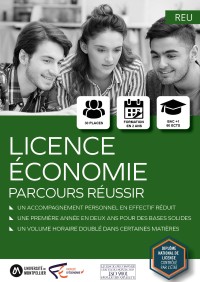
Optional
Business economics
5 creditsMath upgrade
2.5 creditsVoltaire Certification
English
2 creditsPrinciples of economics
5 creditsStatistics
2.5 credits
Mathematics 2
2.5 creditsPolitical Science
4 creditsLaw
4 creditsHistory of economic events
5 creditsMicroeconomics
2.5 creditsOptional
Macroeconomics
2.5 creditsMathematics/statistics
2.5 creditsMicroeconomics
2.5 creditsEnglish
1 creditContemporary economic issues
4 creditsOptional
Bachelor's Degree in Economics, Health Access Track (LAS)
In France, admission to health professions—medicine, midwifery, dentistry, and pharmacy—is based on the MMOP competitive exam. Licences Accès Santé (LAS) allow students to prepare for this exam while pursuing a bachelor's degree in their chosen field, and offer the possibility of submitting up to two applications to the MMOP exam between the first and third years of their bachelor's degree ( ).
The Faculty of Economics at the University of Montpellier offers a Bachelor's degree in Health Economics, designed for students who wish to pursue a career in health studies while acquiring a solid foundation in economics. This program provides a secure pathway, allowing students to continue their studies in a coherent manner if they are not admitted to a health program.
Students enrolled in LAS Economics pursue their bachelor's degree within the Faculty of Economics. The program consists of some of the core courses from the traditional Economics bachelor's degree (48 ECTS), supplemented by a minor in health (12 ECTS), which is integrated from the first year onwards.
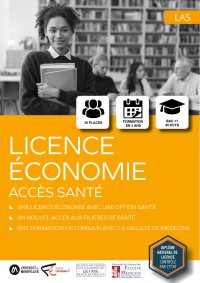
EU common health (prerequisite for MMOP application if ACQ)
12 creditsMedicines and Other Health Products (MAPS) 2 ECTS
2 creditsChoose 1 out of 4
Humanities and Social Sciences (HSS) 5 ECTS
5 creditsChoose 1 from 1
General Human Physiology (PHG) 5 ECTS
5 creditsChoose 1 from 1
Principles of economics
5 creditsPolitical Science
4 creditsLaw
4 creditsMathematics for Economists 1
5 creditsOptional
Contemporary economic issues
4 creditsMathematics and Statistics for Economists - 2 -
5 creditsLANGUAGE SELECTION 1
2 creditsChoose one of two options:
Spanish S2
2 creditsEnglish S2
2 credits
Statistics 1
5 creditsGeneral accounting
Macroeconomics 1
5 creditsMicroeconomics 1
5 creditsChoose 1 out of 3
Optional
Bachelor's degree in Economics, ENS D2 preparatory course
The integrated preparatory program at the École Normale Supérieure (ENS), set up in partnership with the Lycée Mermoz in Montpellier as part of a cooperation agreement, has been running for several years. It is aimed at a cohort of around forty students with high academic potential, who simultaneously follow university bachelor's degree courses and prepare for the ENS Paris-Saclay (formerly ENS Cachan) entrance exam.
As part of this Prep School–University partnership, students in the preparatory class take certain courses at the University, where they sit the corresponding exams. The results obtained at the University, combined with those from the preparatory class, enable the validation of the first and second years of the Bachelor's degree.
The ENS D2 preparatory class offers an excellent education in economics and management for motivated students with a strong academic background, particularly in mathematics up to the high school diploma level. It opens up a wide range of opportunities, both in terms of further study—entrance exams for prestigious universities, IEP, selective university programs—and professional careers in the public and private sectors.
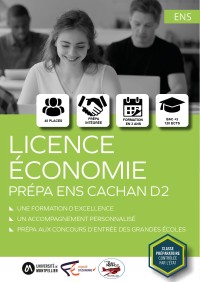
Mathematics for Economists 1
5 creditsLaw
4 creditsLANGUAGE SELECTION
2 creditsChoose one of two options:
English S1
2 creditsSpanish S1
2 credits
Business economics
5 creditsPolitical Science
4 creditsHistory of economic events
5 creditsPrinciples of economics
5 creditsOptional
Optional
LANGUAGE SELECTION
2 creditsChoose one of two options:
English S2
2 creditsSpanish S2
2 credits
Contemporary economic issues
4 creditsMathematics and Statistics for Economists - 2 -
5 creditsStatistics 1
5 creditsGeneral accounting
Macroeconomics 1
5 creditsMicroeconomics 1
5 creditsChoose 1 out of 3
Mathematics for Economists 3
5 creditsLANGUAGE SELECTION
2 creditsChoose one of two options:
English S3
2 creditsSpanish S3
2 credits
Macroeconomics 2
6 creditsSociology
4 creditsComputer Science S3
2 creditsMicroeconomics 2
6 creditsStatistics 2
5 creditsOptional
Optional
Organizational management
5 creditsMicroeconomics 3
6 creditsMacroeconomics 3
6 creditsLANGUAGE CHOICE English or Spanish
2 creditsOption 2 S4 L2 ENS
3 creditsOption 1 S4 L2 ENS
3 creditsStatistics 3
5 credits
Option selection S5 L3 ENS
5 creditsChoose one of two options:
History of in-depth economic events
5 creditsManagement sciences
5 credits
Industrial organization
LANGUAGE SELECTION
2 creditsChoose one of two options:
English S5
2 creditsSpanish S5
2 credits
Game theory
4 creditsIntroduction to Econometrics
4 creditsEcological transition for sustainable development
2 creditsGrowth economics
5 creditsIn-depth economic policies 1
5 creditsOptional
Economic and social policy
5 creditsInternational economics
4 creditsLANGUAGE SELECTION
2 creditsChoose one of two options:
English S6
2 creditsSpanish S6
2 credits
Data analysis
3 creditsDatabase
4 creditsFinancial analysis
4 creditsIn-depth economic policies 2
5 creditsIn-depth contemporary economic and social issues
3 creditsOptional
Bachelor's Degree in Economics, CPES track - Modeling and Digital Technology in Economics
The University of Montpellier and Lycée Joffre offer a CPES (Preparatory Cycle for Higher Education)in Modeling and Digital Technology in Economics. This selective three-year program, co-organized by the high school and the university, leads to a bachelor's degree and offers a sought-after dual skill set, with an introduction to research in the first year.
Students benefit from enhanced supervision by preparatory class teachers and university lecturers and researchers. The first year combines a core curriculum in computer science, mathematics, humanities, and general culture with specific courses depending on the chosen path. Specialization occurs gradually, accompanied by projects and introductory research internships.
The original CPES program alternates between high school and university: in the first year, students spend four days at high school and one day at university to further their studies and carry out projects. In the second year, time is divided between the two institutions, and in the third year, the bachelor's degree is completed entirely at university with additional courses to strengthen digital and IT skills.
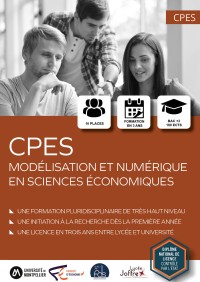
Mathematics S1 (Joffre)
5 creditsModern Language S1 (Joffre)
2 creditsAdvanced CPES Microeconomics S1
4 creditsContemporary World Issues S1 (Joffre)
2 creditsComputer Science S1 (Joffre)
4 creditsAdvanced CPES Computer Science S1
2 creditsAdvanced CPES Mathematics S1
2 creditsGeneral Culture S1 (Joffre)
2 creditsEconomics S1 (Joffre)
7 creditsOptional
Advanced CPES Mathematics S2
2 creditsContemporary World Issues S2 (Joffre)
1 creditMath S2 (Joffre)
5 creditsComputer Science S2 (Joffre)
4 creditsAdvanced CPES Macroeconomics S2
4 creditsEconomics S2 (Joffre)
7 creditsCPES Economics Project, 10th grade
1 creditAdvanced CPES Computer Science S2
2 creditsGeneral Culture S2 (Joffre)
2 creditsModern Language S2 (Joffre)
2 creditsOptional
Math S3 (Joffre)
2 creditsAdvanced CPES Mathematics S3
2 creditsEnglish CPES S3
1 creditAdvanced CPES Computer Science S3
2 creditsGeneral Mathematics Supplements CPES S3
2 creditsAdvanced Study 1 Economics CPES S3 (Statistics + Econometrics)
6 creditsComputer Science S3 (Joffre)
2 creditsEconomics S3 (Joffre)
6 creditsGeneral Culture S3 (Joffre)
1 creditAdvanced Study 2 Economics CPES S3 (Eco+Digital)
6 creditsOptional
General Culture S4 (Joffre)
1 creditAdvanced CPES Computer Science S4
2 creditsMath S4 (Joffre)
2 creditsApplied Microeconomics
5 creditsAdvanced Study 1 Economics CPES S4 (Statistics + Econometrics)
6 creditsAdvanced CPES Mathematics S4
2 creditsCPES Economics Project S4
3 creditsComputer Science S4 (Joffre)
2 creditsEnglish CPES S4
1 creditEconomics S4 (Joffre)
6 creditsOptional
Introduction to Econometrics
4 creditsGame theory
4 creditsEnglish S5
2 creditsOptimization
3 creditsIndustrial organization
Economy and Digital Technology
5 creditsOptional
Economy and digital technology
4 creditsOperational research
3 creditsData analysis
3 creditsDatabase
4 creditsEnglish S6
2 creditsProject L3 CPES S6
5 creditsOptional
Admission
Admission requirements
- For Bachelor's Degree 1: High school diploma or equivalent
- For the second year of a bachelor's degree: first year of a bachelor's degree or equivalent (after review by a committee)
- For Bachelor's Degree 3: Bachelor's Degree 2 or equivalent (after review by the committee)
Registration procedures
First year of a bachelor's degree
If you are in your final year of high school or wish to change direction for the start of the academic year in the first year of a bachelor's degree, you must apply via Parcoursup between January and March. Admission offers and responses to applicants will be sent out on a rolling basis between June and July.
2nd and 3rd year of bachelor's degree
To gain equivalent access to the second or third year of a bachelor's degree, the ecandidat procedure is mandatory.
economie.edu.umontpellier.fr/applications/applications-and-admissions/
Target audience
High school and college students from the Montpellier Academy, the Occitanie region, France, and abroad.
Tuition fees
Tuition fees are set each year by the Ministry of Higher Education. They are accompanied by the Student and Campus Life Contribution (CVEC).
The entire program is free for students receiving scholarships.
Recommended prerequisites
Possess mathematical and statistical skills essential to economics and management
Economics courses frequently use mathematical modeling to better understand the problems being studied and analyze the resulting findings in a logical manner. In addition, many careers in economics and management rely on the analysis of numerical data.
Know how to use written and oral communication skills and logical reasoning to argue a conceptual argument.
Economics courses require students to be able to produce structured arguments, even relatively simple ones (this skill is intended to be reinforced at university), and to reason about concepts. A bachelor's degree program requires a certain capacity for abstraction, formal logic, and deduction.
Jobs in economics often involve writing studies or reports that require structured argumentation, synthesis skills, and a good level of language proficiency.
Have a broad general knowledge
Economic thinking is informed by current economic, political, and societal events. Students must therefore be able to identify and understand the societal issues related to the topics covered during their studies.
Possess methodological and behavioral skills in order to be able to work independently and responsibly.
In a bachelor's degree program, students are responsible for their own education and success. They must therefore be able to organize their work, seek out the resources available to them, and find time for group work.
Have English language skills
There are many sectors of the economy where professional and academic documentation and business relations are based on English. Skills in this language are therefore essential.
And after
Continuing education
Approximately 90% of students continue their studies after completing their bachelor's degree (mainly in master's programs). Most master's programs in economics and finance in France are selective and require a bachelor's degree in economics.
Other students take civil service exams or enroll in business schools through parallel admission. A very small number stop studying after obtaining their bachelor's degree.



